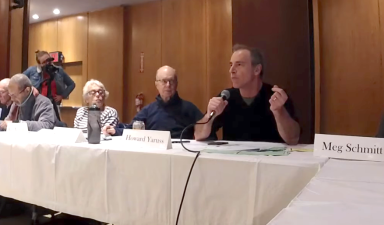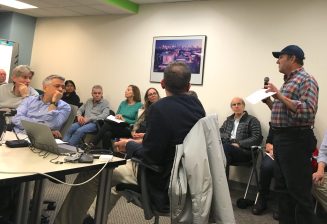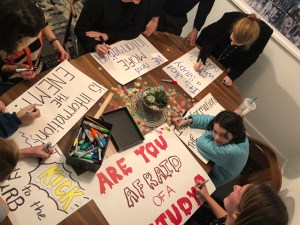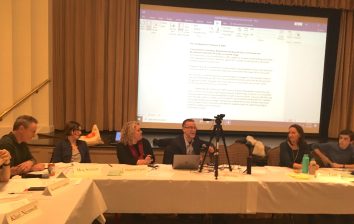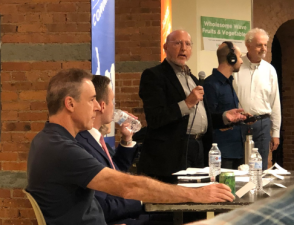Upper West Side Panel Approves Neutered ‘No Parking’ Study
CB 7's much-neutered resolution passes — finally! — with a huge display of parking angst.
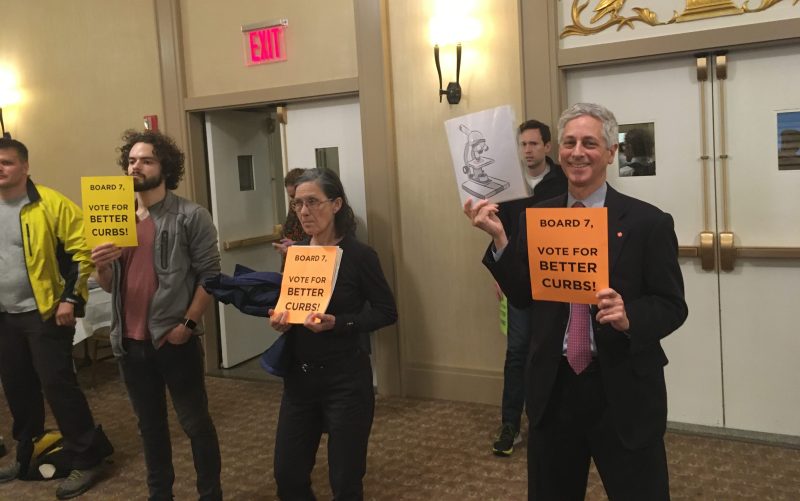
After months of recriminations from entitled Upper West Sider car owners, Community Board 7 last night passed a common-sense resolution asking the Department of Transportation to “assess current policy regarding parking and curbside usage.”
The resolution — which was watered down during eight months of public meetings and even two closed-door sessions in order to neutralize vociferous objections by the neighborhood’s car-owning minority — nonetheless occasioned an hour of impassioned debate.
Hundreds of residents packed the room, and 62 speakers lined up to exhort the board — half for the resolution and half against (for some reason, the “sides” were equal in number, even though only 25 percent of households in the neighborhood have cars).
In the end, 22 board members voted in favor, 12 voted against, and three abstained. [Full text is below.]
“It’s an inquiry on what can be done on how to improve the streets,” the board’s Transportation Committee Chairman Howard Yaruss said by way of introducing the resolution. “You’re not going to be worse off for getting information.”
Even so, dozens of speakers rose to claim that they would, indeed, be made worse off by the document.
They repeated plaints heard at previous meetings: The removal of free street parking (which the resolution does not call for) amounts to a “regressive tax” against middle-class New Yorkers; their cars are a necessity for visiting ailing parents, they don’t use cars to commute inside the city, only to escape to their weekend homes; free parking is not free, because drivers “pay taxes” for it; their small businesses depend on their ability to store their cars in public space whenever and wherever they want for free; they can’t ferry special-needs children (or mobility-impaired parents) on public transportation; any study should examine the Upper West Side’s needs for more free parking (which, indeed, the study could conclude is necessary).
One board member, Jay Adolf, called the resolution “a stalking horse to further the interest of getting rid of free parking,” adding that “to encourage a study [of curbside uses] by the DOT is a monumental waste of time” given that the city “is committed to hundreds more miles of protected bike lanes.”
But more board members agreed with the sentiments of Streetopia West Side Director Lisa Orman, who testified that “there are opportunity costs to devoting that much public space to one use — instead, we could have busways, car share, daylighting, loading zones, taxi stands, neckdowns, bike corrals. We could have more open spaces for neighbors to meet and talk.”
They rejected a bid by car-promoting provocateur Tag Gross, the force behind the Orwellian-named website Common Sense Streets, to substitute a resolution asking the city only to “study the impact of congestion pricing” on the Upper West Side. (The enabling legislation for congestion pricing authorizes such a study in any event.)

Gross, however, was undeterred after the vote.
“Guys, we may have lost this round, but it is a small battle and where we have really won is that they have inadvertently woke us up, brought us together and galvanized us!” he wrote his minions in an email after the vote. “The vote was close and you could hear that we had a lot of support on the board. What next? We need to monitor these meetings, especially the transportation committee and the Broadway task force and we will await the results of the study. If the study even gets done.”
And he closed with a note of glee: “The good news is alt side is suspended tomorrow; It’s Wednesday!”
Following is the resolution adopted last night:
Request for a Study on Curbside Usage
- Our community currently suffers from traffic congestion, rampant double parking particularly due to growing e-commerce deliveries, significant “cruising” for parking and a substantial number of injuries to street users.
- Congestion pricing is scheduled to be implemented in approximately one year and community residents and business owners have expressed concern about the impact of this new policy.
- How we use our curbside space has remained largely unchanged for many decades while our city has changed dramatically. This city-owned land should be used for the greatest good for the greatest number of people, with a particular focus on the needs and concerns of the residents and businesses of our community.
- THEREFORE, BE IT RESOLVED THAT Community Board 7/Manhattan requests that the city: (1) assess current policy regarding parking and curbside usage, (2) advise us as to whether there are policies that could provide greater benefit to the community, improve traffic flow and promote safer streets, including, but not limited to, paid residential parking permits, metering with surge capability and strategies learned from studying the practices of other major cities, and (3) conduct studies both before and after the implementation of congestion pricing to establish its effect on the community.
